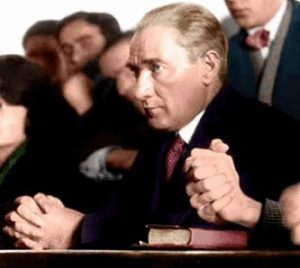Turkish nationalists?
Dear Editors,
I have to say that I am absolutely shocked to have come across a piece that subtly spouts Turkish ultra-nationalism in the magazine. I have always thought highly about this magazine but cannot comprehend how the piece ‘Candle in the Wind’ made it to the January edition? Really, how did that happen?
The author, of whom I have no prior knowledge, calls the founding father of the Turkish nation-state republic Ataturk a ‘democrat’, while Ataturk is held responsible for ethnic cleansing by millions of Kurds and other non-Turks in Turkey!
The history he has tried to ‘shed light on’ from a candle, and through which he makes his subtle dark propaganda is also inaccurate. There is no mention of brainwashing of the peasantry to the state’s imposed notions of ‘one nation, one flag and one language’, which led to massacres, we are talking massacre of civilian Kurds, Alevis and others. It was also the preparation of the new generation for massacres at the orders of the military generals in charge of a state, which outright denied the existence of tens of millions of other ethnic and religious communities in the country.
The author shamelessly declares that ‘the dream of Ataturk, Ismail Hakki Tonguc, Mahmut Nakal and many others of a secular education, based on the foundations of inquiry, science and rationality that is free and democratic …’ Any socialist with a slightest understanding of modern Turkey’s treatment of its workers and peasantry, and the tens of millions of non-Turks, would vomit after reading such lines of subjective propaganda beating the drums of Turkish republican nationalism, which seem to come from a Kemalist fascist apologist rather than ignorance.
Also, what the hell is with the Turkish flag printed with this piece in the magazine, why the hell is that there when the first line clearly states Turkey, Turkish, and Ataturk the father of the nation. And don’t sell me any insight into journalistic techniques of illustration which rejects displaying of flags even by its basic liberal standards.
The piece written under the guise of ‘enlightenment’ is an insult added to the injury of millions of non-Turkish workers and peasants, those whose memories of childhood haunts them to this day for they were forced to stand in line at school yards each day to shout out Ataturk’s slogan: ‘Happy is he who says I am a Turk’. That motto is to this day imposed at schools on Kurdish children across the country whose right to education in their mother tongue is suppressed with the Turkish state’s barrels of guns, drones and other weaponry.
I really did not expect this garbage, I am still shocked. Still can’t believe that the Trojan horse of racist Turkish ultra-nationalism has reached this party too. Unbelievable! I hope to see a report in the magazine to make it clear that the party does not share the view that Ataturk and other butchers in his circle were Turkish ‘democrats’ as the author of that piece had declared.
ARAM CHYA
The Writer Replies:
Reading this ‘critique’ of my article both surprised and shocked me. That anyone could find the story of an attempt to raise a population out of ignorance with a secular, rational, science-based education to be so contentious and nationalistic is puzzling. Being cast as a ‘subtle, dark propagandist’ for Turkish nationalism is lost on me, I’m afraid.

The use of certain words, in this case ‘Turk’, Turkish’, ‘Ataturk’, etc are always going to trigger an angry, out-of-context response from some corner or other. It is, perhaps, to be expected on social media but here, amongst the thoughtful readers of the Socialist Standard, less so. The context of the Village Institutes is a brief period of approx. 10-12 years in the history of the Turkish Republic.
This is indeed a story of a ‘Candle In The Wind’ – a system of education so radical, so egalitarian, so anti-elitist that the nationalists, the religious conservatives and privileged elites, joined together to destroy this model and those visionaries behind it before it destroyed them. Many of the educationalist visionaries along with many students were persecuted, imprisoned, exiled or fled – their reputations and lives in tatters.
Three minor points: (1) the flag is something that the editorial team should address [The Turkish flag was indeed just an illustration with no intended political significance; as far as we are concerned, all national flags are just rags on the end of a pole – Editors]; (2) the article was not addressing the current state of education or politics in Turkey; (3) nowhere did the article claim that Ataturk was a democrat.
The Socialist Party of Great Britain does not need to make any apologist statement – its position on nationalism has been clearly stated and is freely available. Socialism is about people and how they collectively choose to manage their affairs and the resources of the planet. No nation states, no money – from each according to ability, to each according to need.
I respectfully ask our correspondent to reread the article, if necessary substitute other names or another country and try to see it for what it is. In a world filled with bigotry, racism, nationalism, war and suffering we need ‘candles’ and we need candleholders – people who embrace other people and cultures.
ALAN FENN
